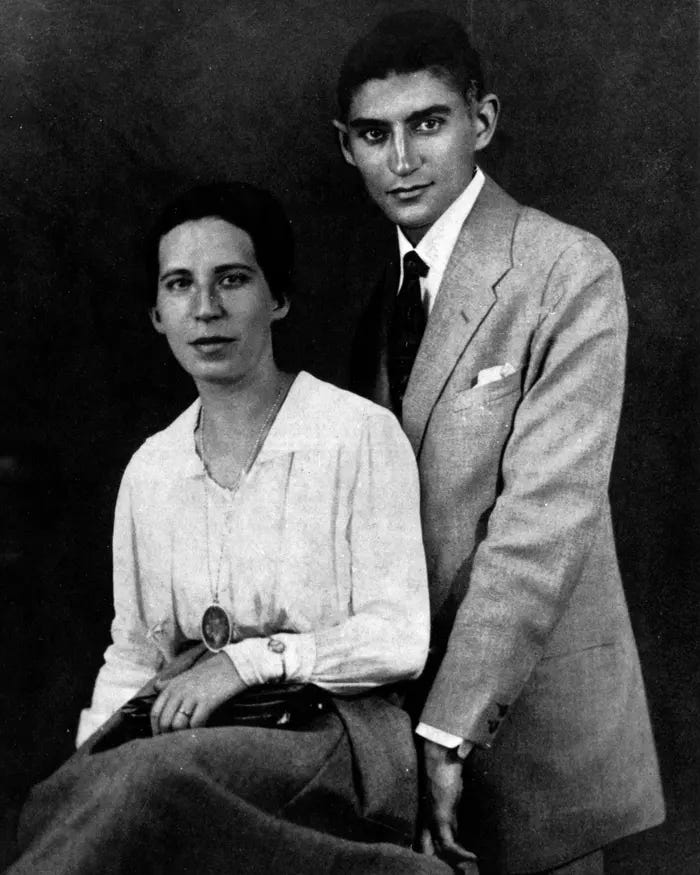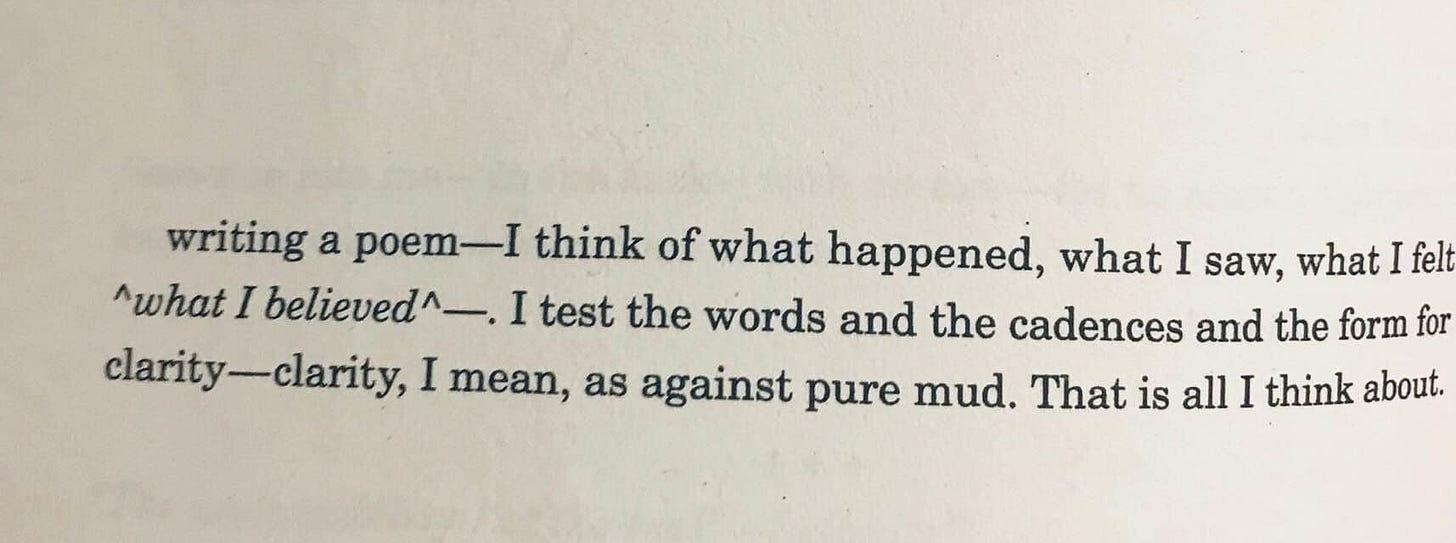Writing Problems: Clearer and Worse
Kafka, Oppen, Brock-Broido
This column was sent to paid subscribers in July. I am reposting it here in advance of a course I’m going to be teaching on Kafka beginning January 20.
Writing is tantamount to thinking.
If that’s the case, then the act of writing should clarify, refine, and sharpen our thoughts. But is this clarity always good for the writer? Is writing an automatic good?
Some people find writing cathartic: absorbing, expressing and releasing the energy of their lives. I’ve never found this to be the case. To me, writing is an endlessly frustrating task. The challenge of filling a blank page only gets harder, the further I go. What’s more, whatever clarity writing I gain through writing leads to more questions, more confusion, more frustration.
Of all the writers that ever lived, Franz Kafka (1883 - 1924) is the one with whom I feel the most connection. Even though he had no poetry in his soul, it’s Kafka who I admire and understand the best, and who offers me the most understanding in return. Perhaps it’s because our lives are layered on the same template. We had similar upbringings, and share similar anxieties; similar ways of filtering all anxiety into our digestive system.
Kafka published few of his stories during his lifetime, but his fundamental struggle with writing the truth about his own psychological conundrums—what he called “the floors of my interior Tower of Babel”—makes his fiction seem almost prophetic.
His plots—a prophecy of nameless bureaucracies putting people on trial without any explanation, confronting one’s smallness in the world by becoming an enormous beetle, a machine that carves the sentence of a condemned prisoner on his skin over twelve hours—these see a world like our own, but different from our own. His metaphors are as apposite to the 21st century, as to the early 20th century, when he wrote them.
His essential worldview was something frightening and familiar; something “scintillating with wickedness” about which, nonetheless, he could laugh.
But writing, to Kafka, was no laughing matter. On Friday August 1, 1913, Franz Kafka wrote to his fiancée, Felice Bauer, to correct a misunderstanding they’d had:
(We’ll come back to his relationship issues shortly.)
Felice thought Kafka meant that writing ought to make everything clearer. Kafka was actually saying that writing makes everything “clearer and worse.” What Kafka meant by this, and what was happening in his life at the time, is worth explication. The implications of his statement—the clearer and the worse—are important for writing.
Clearer: To devote oneself to writing means first of all, being dissatisfied with the way things are. It asks that we look directly into the pale eyes of reality, to be aware of all life and death palpitating around us, and to name it with as much clarity and beauty as possible.
Worse: To do these things honestly does not bring happiness. It means listening to every input pinging at all moments; it means living in a difficult way that’s not often aligned with the terms of the world around us.
So, it’s both.
Franz and Felice
Kafka and Felice Bauer met the evening of Tuesday, August 13, 1912 at a dinner at his friend Max Brod’s house. Kafka was working as a lawyer for the Workers’ Accident Insurance Institute. His job was to assess workplace accidents, injuries, and deaths at various factories in Bohemia, determine their insurance rates, and assess whether or not they were complying with state insurance laws.
Since 1909, Felice had been working at Carl Lindström, Inc., a German manufacturer of gramophones and office machines. She was in charge of sales of Parlographs—for the time, a sophisticated dictation machine. Her responsibilities included traveling to sales conventions, and she had dozens of meetings a day, often until 7 pm.
Kafka and Felice were engaged twice, but as the letter I quoted above shows, they constantly misunderstood one another. They never married.
Kafka valued being alone, and believed everything he accomplished in his writing was the result of being alone. He wrote in his diary of his “fear of the connexion, of passing into the other. Then I’ll never be alone again.” At the same time, he felt that he was “incapable, alone, of bearing the assault of my own life, the demands of my own person, the attacks of time and old age, the vague pressure of the desire to write, sleeplessness, the nearness of insanity.”
“Clearer and worse” exemplifies Kafka’s essential contradictions. His ability to understand the contradictions inside himself made it possible for him to locate the contradictions of the world around him. The prophecy is not being foretold so much as accurately described.
Kafka’s lived his life with unsettling intensity. His characters—K., Gregor Samsa, and Joseph K.—illustrate the tenor of his life. He was a deeply interior person caught in a bureaucracy, haunted by conflicted feelings for his father and Felice, made anxious and alienated as a German-speaking Jew, a double minority in Prague at at time of rising antisemitism.
“against pure mud“
Writing can make things more clear, because writing is tantamount to thinking. Writing poems is risky because it means we must refuse to accept words as they are; the inert bricks that they are in daily use.
George Oppen said it this way:
There is no such thing as clear writing and unclear thinking. Often when poems have some kind of block it’s because the poet’s thinking is stuck somewhere; technical facility is nothing without clear thinking.
Writing makes things worse. Once a poem is finished there is a release and a breath, but it’s short-lived. There is a cost for the clarity poems provide. It’s intolerable to write, and it’s intolerable not to write.
Many writers experience a kind of “postpartum” depression when their book comes out: they’ve devoted so many years of energy to the book, and once the book exists apart from the poet who made it, the poet doesn’t know what to do with themselves.
Lucie Brock-Broido developed a strategy to accept this situation for what it is:
I have a peculiar, and reliable, and renewable pattern of writing. Every year I forsake writing for at least six or seven months. Each October, I begin again.
She has to forsake writing, because writing is strenuous.
In poem after poem, the poet must face the knotty, disappointing, mystifying truth within themselves—and then leave that truth exposed in the world. And it’s impossible for a poet to look both deeply into their interior, and intently at the outside world, without experiencing their alienation from both spaces.
These are the real costs of writing.
So, the writer in some ways represents the conundrum of our moment: to face reality without blinking and without judgment; to clarify it, to brush it and smooth it until it is so transparent, that—like Kunitz said—you can look through it and see the world.
Kafka lived through all this. And then he died, of tuberculosis, in 1924. His sisters were murdered in concentration camps in the Holocaust. Felice escaped the Nazis to Switzerland, and moved to the United States in 1936. In 1950, she sold her letters from Kafka to Schocken Books for a mere $8,000. She died in Rye, New York in 1960.
We don’t know what to make of Felice Bauer’s misunderstanding—her letters were never saved, so we can’t know what she might have said in response—but in her misunderstanding we can read our own frustrations. We expect writing to make things better, but it makes things both better and worse.
I will be teaching a 6-week class on Zoom, Franz Kafka’s Insights for the 21st Century
The class begins January 20 for six consecutive Thursdays, 6:30-8:30 pm EST.
This course will be about the life and writing of Franz Kafka (1883-1924). We will read selections of his work to more fully understand Kafka’s world, his writing, his thinking, and what we can learn from his fiction for our own writing. We will focus on the most important years of his life and the culture of Prague during 1910-1915. We will examine his family, his work, psychological development, fascination with Zionism, engagement to Felice Bauer, and his illness.
Register here: https://www.writerscenter.org/calendar/kafka/
About Sean Singer




